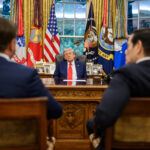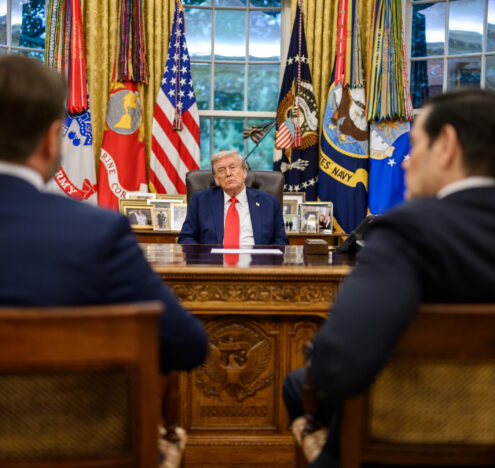Editor’s note: This is the second part of an examination of UN peacekeeping. You can read the first part on the need to return UN peacekeeping to its diplomatic roots here.
When we imagine the future of UN peacekeeping, we have to begin by asking: What is peacekeeping for in the twenty-first century? Who is peacekeeping for, if it does more of what the militaries of powerful states do? Is it in service of the conflict-stricken — the peoples of the United Nations, in whose name the UN Charter is issued, as Kofi Annan famously reminded member states? Is it in service of a peace that allows these people to flourish? Or is it a tool primarily to uphold a particular idea of sovereignty — to keep reproducing the compact of states that constitute the United Nations?
We especially have to ask these questions given the staggering transnational crises states will certainly face in the decades ahead — not the old horse of terrorism, but climate change and mass displacement driving desperate flights that won’t be resolved or stopped with more intelligence-gathering, or more guns, or more authorizations to use force. People will flee, or people will die, or people will flee and they will die — and international tools recalibrated toward counterinsurgency or state stabilization will do little to help them. Today, reluctant governments have mostly reacted to migration by reasserting the primacy of hard borders, placing the rights of the state above people’s right to move and migrate and save themselves. Peacekeeping is an international intervention into crisis that succeeds best when it is all carrots and no sticks — but how can that kind of a tool survive in a world where restoring order may require enacting the work of increasingly illiberal states, and where alternative mechanisms of resource distribution and order seem decreasingly possible?
In my book, I examine cases where parties to conflict have little faith in the UN’s ability to enforce peace, or no expectation of being held to the terms of their peace agreement, or little actual interest in peace, and ask why they still pursue UN involvement in their conflicts. Sustained examination of the Rwandan and Guatemalan peace processes reveals that even when parties to conflict are wary of the UN as a security guarantor, they still value the things the international community can bring to conflict-stricken places. Governments and rebels alike might seek out UN intervention because the UN’s involvement in peacemaking and peacekeeping affords them benefits that only the international community can bring — some of which may have nothing to do with peace.
If peacekeepers are to protect civilians and uphold the rights central to the UN’s mission, then peacekeepers can’t harden into simply soldiers alongside other soldiers. They must remain distinct in a landscape dotted with hawks — people facing persecution and violence need peacekeepers’ protection and their assistance far more than states need their force.
Some parties to conflict will want little more than to strike a deal, end bloodshed and suffering, and mitigate the costs of war. But for others, UN involvement can also bring tactical, material, or symbolic benefits. First, meeting with international mediators can offer combatants opportunities away from the battlefield to regroup, rearm, and launch unexpected attacks: international actors buy belligerents time. Negotiation can also empower factional leaders, who represent their parties at the negotiation table, or grant parties a way to enact otherwise-impossible domestic political agendas. Second, intervention can also have material benefits — international involvement can reconstitute the local economy; can entail statebuilding; or can help desperate parties to conflict undertake immense and otherwise impossible projects like refugee resettlement. Finally, UN involvement in conflict termination can have symbolic benefits for parties to a conflict, including recognition from the international community as valid partners and legitimate political actors in peace and post-conflict processes. Combatants who turn to the UN to secure aid and economic infusions from third parties, or to cultivate their images and identities as appropriate, internationally recognized, equal parties in conflict resolution may not be especially interested in peace and security.
In Rwanda, the UN’s massive peacekeeping failure during the genocide would have made turning back to the UN for a second peacekeeping mission after the genocide seem like an unlikely choice — but the post-war Rwandan government did precisely that, as part of an effort to bring multilateral legitimacy to post-war reconstruction efforts that might otherwise have been viewed as victors’ justice. In Guatemala, warring parties actively worked to minimize the UN’s role as a security guarantor while using the UN’s presence to pursue domestic political goals — the new civilian leaders of the state, for example, appear to have used the negotiation process to break domestic political impasses they held with the military, which had long ruled the country. The UN’s involvement in negotiations also became a way for the Guatemalan government to attract international investment and aid even while its international image was increasingly tarnished by allegations of mass atrocity and systematic human rights violations, as it became clear that donor countries would condition financial support on peace process compliance. Clear lessons from earlier cases are never easy to apply simply to newer cases. But it’s clear the UN’s nonmilitary tools are attractive even when combatants are reluctant parties to peace, and that these tools can be more desirable to combatants at times than yet another set of heavily-armed actors in an already-suffering place.
Today, the future viability of these nonmilitary tools hangs in the balance. The UN — along with the member states who authorize, staff, and monitor these missions — should retain the ability to use peacekeeping’s political, diplomatic, and humanitarian tools. Leaning heavily into the logic of greater force, counterterrorism, and counterinsurgency may make it harder for the UN to push the other important levers it has. The legitimating role the UN plays in negotiation processes in these stories is particularly tricky: a more military posture — particularly one that so favors the state — may undermine the UN’s ability to bring rebels, insurgents, and secessionists to the table. Why, after all, negotiate under the offices of an organization that might immediately partner with the state to fight you?
Emphasizing peacekeeping’s diplomatic and humanitarian roles, as opposed to warfighting or counterinsurgency, enables the UN to retain its political tools for conflict resolution. Analysts have lamented the “Christmas Tree” style of peacekeeping mandate, which charges peacekeepers with everything from addressing HIV/AIDS crises to holding elections. But the virtue of these mandates is that they might allow peacekeepers to do more of what affected communities might want — particularly if they’re undertaken in meaningful consultation with the local community, including refugees. This route has its own horrifying ethical dilemmas, especially if it’s divorced from meaningful local ownership and meaningful negotiation processes — even without peacekeepers on the ground, as the Syrian Civil War demonstrates, the UN risks complicity in furthering citizen repression and death when its role in humanitarian aid and post-conflict reconstruction depends on the consent of a murderous regime. Recent Security Council gridlock over authorizing humanitarian crossings between Turkey and Northern Syria swung precisely on questions of state sovereignty versus assistance for suffering civilians, with Russia arguing that multilateral aid for displaced populations undermines Syrian sovereignty — that the Syrian government should receive and disperse all aid.
But difficulty navigating the complications of host state interactions can’t be enough to abandon efforts at humanitarian relief where people need it most. And when the state decides who is and is not an insurgent, pushing peacekeeping to become just another way to enforce the will of insecure states through counterterrorism and counterinsurgency efforts is at best counterproductive and at worst a betrayal of the UN’s commitment to civilians. Peacekeepers are not angels — at their worst, they can perpetrate human rights violations, rape and exploit vulnerable people, and accidentally or purposely exacerbate disasters. But at their best, they can meaningfully help people with few other options. Accordingly, the UN’s task in peacekeeping and peacemaking should be easing the suffering of civilians while attempting to arrive at a political solution for combatants.
The UN is better positioned as executor and underwriter to those efforts than as another hand driving war. If peacekeepers are to protect civilians and uphold the rights central to the UN’s mission, then peacekeepers can’t harden into simply soldiers alongside other soldiers. They must remain distinct in a landscape dotted with hawks — people facing persecution and violence need peacekeepers’ protection and their assistance far more than states need their force. People need fewer guards, while people’s rights need more guardians.
Anjali Kaushlesh Dayal is an assistant professor of international politics at Fordham University. She is the author of the forthcoming Incredible Commitments: How UN Peacekeeping Failures Shape Peace Processes (Cambridge University Press).




















